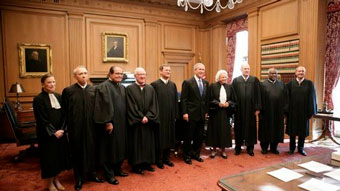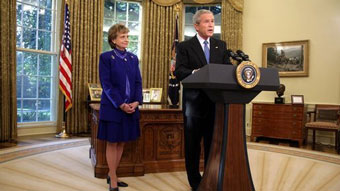George W. Bush’s Supreme Court nominations
White House advisors reveal the strategy for selecting new justices
The Republican Party’s 2000 platform included five references to the nation’s highest court, citing differences with its liberal decisions on issues such as voluntary prayer in public schools, use of public school premises by religious organizations, partial-birth abortion, and the exclusion of illegally gained evidence (which it condemned for letting “countless criminals get off on technicalities”), but agreeing with its conservative ruling to ban the “involuntary use of union dues for political purposes.”

The party platform took aim at “scores of judges with activist backgrounds in the hard-left [who] now have lifetime tenure” and promised that “Governor Bush is determined to name only judges who have demonstrated respect for the Constitution and the processes of our republic.”
The party platform promised that 'Governor Bush is determined to name only judges who have demonstrated respect for the Constitution and the processes of our republic'
Judicial restraint (as opposed to judicial activism) is the hallmark of conservative legal philosophy, which purports to interpret the Constitution based on the framers’ “original intent” and to construe their language, and that of subsequent laws, using the “literal” definitions of words at the time the laws were written. Justice Scalia, a 1986 Reagan appointee, embodied this jurisprudence and became the avatar for Republican presidential candidates when referring to their future Supreme Court nominees.
Judicial restraint (as opposed to judicial activism) is the hallmark of conservative legal philosophy
Bush’s acceptance speech at the 2000 Republican convention eschewed references to the third branch of government. He did, however, raise the legislative and judicial issue of partial-birth abortion, declaring that he would sign a bill to ban it. As the leader of a party that had longed to reverse liberal jurisprudence since the 1960s, Bush was prepared to act if an opening arose on the Supreme Court.
“We solicited thoughts early on in a very low-key way from Judiciary [Committee] members to say who should we be looking at. We even got suggestions from Democrats. [Joseph] Lieberman, for example, gave us some input about possible Supreme Court [nominees],” remembered Karl Rove, Bush’s senior advisor and White House deputy chief of staff for policy. “We [were] just getting prepared. It was low key, but we were building internally our own roster of people.”

As Harriet E. Miers, Bush’s staff secretary and then White House counsel, put it, “We had an evergreen process because somebody could drop over unexpectedly or retire unexpectedly, and so you had an evergreen process from which you could choose a replacement for a Supreme Court justice. When I arrived in the counsel’s office or in preparation for arriving [in 2005], there were a lot of materials that had been generated to analyze potential nominees. There had been a selection of people.”
Alberto Gonzales, Bush’s White House counsel and then attorney general, observed that “it was important that [Bush] not make the same mistake as his father did with [David] Souter. So we had the process in place to prevent that from happening.” The second President Bush wanted to avoid naming a Supreme Court justice who was thought to be conservative only to witness his seeming conversion to liberalism once he took the bench, as Souter had done. Gonzales (whom Governor Bush had appointed to the Texas Supreme Court) also remembered that Bush “often commented about nominating the best person possible while avoiding a big confirmation fight.”
It was important that [Bush] not make the same mistake as his father did with [David] Souter
Despite the justices’ advancing age, none stepped down during Bush’s first term. In 2004 the GOP platform once again assailed liberal jurists and promised “judges who uphold the law”:
"Scores of judges with activist backgrounds in the hard-left now have lifetime tenure. Recent events have made it clear that these judges threaten America’s dearest institutions and our very way of life. In some states, activist judges are redefining the institution of marriage. The Pledge of Allegiance has already been invalidated by the courts once, and the Supreme Court’s ruling has left the Pledge in danger of being struck down again—not because the American people have rejected it and the values that it embodies, but because a handful of activist judges threaten to overturn common sense and tradition. And while the vast majority of Americans support a ban on partial birth abortion, this brutal and violent practice will likely continue by judicial fiat."
Scores of judges with activist backgrounds in the hard-left now have lifetime tenure. Recent events have made it clear that these judges threaten America’s dearest institutions and our very way of life
After focusing on specific issues before the nation’s courts, the platform turned to the constitutional principles of separated powers and checks and balances among the three branches:
“We believe that the self-proclaimed supremacy of these judicial activists is antithetical to the democratic ideals on which our nation was founded. President Bush has established a solid record of nominating only judges [to the lower federal courts] who have demonstrated respect for the Constitution and the democratic processes of our republic, and Republicans in the Senate have strongly supported those nominees.”
In contrast, Senate Democrats had filibustered Bush’s nominees, which the platform labeled “obstructionist” as well as “unprecedented and highly irresponsible.”
When Bush rose to accept his party’s renomination, he was nearly three years into a wartime presidency that had begun after the terrorist attacks on September 11, 2001. Most of his convention speech cited his successes against al Qaeda and the long road to victory in the global war on terror. But he also attacked the liberalism of his Democratic opponent, Massachusetts senator John Kerry, and played the cultural divide card: “Because the union of a man and woman deserves an honored place in our society, I support the protection of marriage against activist judges. And I will continue to appoint federal judges who know the difference between personal opinion and the strict interpretation of the law.”
Because the union of a man and woman deserves an honored place in our society, I support the protection of marriage against activist judges
